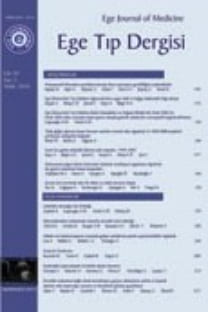IgG'nin tayini için kapasitif bir biyosensör geliştirilmesi
Development of a capacitive biosensor for detection of IgG
___
- 1. Bournazos S, Chow SK, Abboud N, Casadeval A, Ravetch J V. Human IgG Fc domain engineering enhances antitoxin neutralizing antibody activity. J Clin Invest [Internet]. 2014; 124 (2): 725–9. Available from: https://pubmed.ncbi.nlm.nih.gov/24401277/
- 2. Schur PH. IgG subclasses - a a review. Vol. 58, Annals of Allergy. 1987. p. 89–99.
- 3. Nimmerjahn F, Ravetch J V. Immunology: Divergent immunoglobulin G subclass activity through selective Fc receptor binding. Science (80- ) [Internet]. 2005; 310 (5753): 1510–2. Available from: https://science.sciencemag.org/content/310/5753/1510
- 4. Lock RJ, Unsworth DJ. Immunoglobulins and immunoglobulin subclasses in the elderly. Ann Clin Biochem. 2003; 40 (2): 143–8.
- 5. Zhu N, Zhang D, Wang W, Li X, Yang B, Song J, et al. A Novel Coronavirus from Patients with Pneumonia in China, 2019. N Engl J Med. 2020; 382 (8): 727–33.
- 6. Wei X, Li X, Cui J. Evolutionary perspectives on novel coronaviruses identified in pneumonia cases in China. Vol. 7, National Science Review. Oxford University Press; 2020. p. 239–42.
- 7. Weiss SR, Leibowitz JL. Coronavirus pathogenesis [Internet]. Vol. 81, Advances in Virus Research. Academic Press Inc.; 2011. p. 85–164. Available from: https://pubmed.ncbi.nlm.nih.gov/22094080/
- 8. Biosensors : Fundamentals and Applications. Oxford University Press; 1987.
- 9. Berggren C, Bjarnason B, Johansson G. Capacitive Biosensors. Electroanalysis [Internet]. 2001 Mar 1 [cited 2021 Apr 21]; 13 (3): 173–80. Available from: https://onlinelibrary.wiley.com/doi/10.1002/1521-4109(200103)13:3%3C173::AID-ELAN173%3E3.0.CO;2-B
- 10. Daniels JS, Pourmand N. Label-free impedance biosensors: Opportunities and challenges [Internet]. Vol. 19, Electroanalysis. Electroanalysis; 2007. p. 1239–57. Available from: https://pubmed.ncbi.nlm.nih.gov/18176631/
- 11. Mattiasson B, Hedström M. Capacitive biosensors for ultra-sensitive assays. TrAC Trends Anal Chem [Internet]. 2015; Available from: http://linkinghub.elsevier.com/retrieve/pii/S0165993615301138
- 12. Uygun ZO, Dilgin Y. A novel impedimetric sensor based on molecularly imprinted polypyrrole modified pencil graphite electrode for trace level determination of chlorpyrifos. Sensors Actuators, B Chem [Internet]. 2013 [cited 2021 Apr 12]; 188: 78–84. Available from: http://dx.doi.org/10.1016/j.snb.2013.06.075
- 13. Uygun ZO, Şahin Ç, Yılmaz M, Akçay Y, Akdemir A, Sağın F. Fullerene-PAMAM(G5) composite modified impedimetric biosensor to detect Fetuin-A in real blood samples. Anal Biochem [Internet]. 2018; 542: 11–5. Available from: https://www.sciencedirect.com/science/article/pii/S0003269717304542
- ISSN: 1016-9113
- Yayın Aralığı: 4
- Başlangıç: 1962
- Yayıncı: Ersin HACIOĞLU
Genel anestezi altında diz artroplastisi uygulanan hemofili hastalarında kronik ağrı
Zeynep ÇAĞIRAN, Nezih SERTÖZ, Semra KARAMAN, Abdürrahim DERBENT, Ali ZEYDANOĞLU
COVID salgını deri tümörleri yönetimimizi etkiledi mi?
Mehmet Emre YEĞİN, Ersin GÜR, Ecem Esma YEĞİN, Yigit Ozer TİFTİKÇİOĞLU
Metastatik mide kanserinde karsinoembriyonik antijen (cea) prediktif midir?
Duygu Doğa EKİZALİOĞLU, Selen BAYRAKTAROĞLU, Hakan POSACIOĞLU
Mulvihill-Smith sedromunda anestezi yönetimi
Sefazolinin değişen dozlarının in vitro 3T3-Fare fibroblast kültürü üzerine etkisi
Belis KALECİ, Ali Can KOLUMAN, Bülent TANRIVERDİ, Gamze TANRIVERDİ
Geriatrik hastada dental uygulama esnasında implant anahtarının aspirasyonu: vaka raporu
Tayfun GÜNBAY, Selin KENÇ, Gözde IŞIK, Seda KAHRAMAN, Ferit ÇELİK
Saadet OLCAY EVLİYAOĞLU, Hande TURAN, Didem GÜNEŞ KAYA, Gürkan TARÇIN, Oya ERCAN
